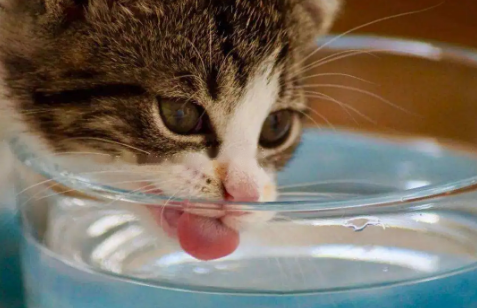Summer is here, and I believe that many shit shoveling officials have put a lot of effort into getting cats to drink water. Because many shit shoveling officers know more or less that once cat owners don't like drinking water, they are easy to get sick, and they will be very gratified to see that they suddenly become like drinking water. I thought the cat became sensible. I can finally rest assured.
In fact, it is not. The sudden increase in drinking water is likely to be a sign of illness, and it is very likely to be suffering from kidney failure! Masters, please have some snacks~
An adult cat, under normal circumstances, needs to drink about 200-300ml of water every day. If you observe unusual behavior of your cat drinking a lot of water, then you should pay attention, as this may be a sign of kidney failure.

Compared with stray cats, domestic cats are more prone to kidney failure
Anyone with a little experience in pet care knows that domestic cats are more prone to kidney failure than stray cats. The number one killer is kidney failure, and kidney failure and liver failure have always been at the forefront of pets cat deaths. Most of the domestic cats receiving emergency treatment in pet clinics are due to acute kidney failure. Experts have found through research that even though most stray cats are thin, they rarely suffer from kidney failure.
Why do well-off domestic cats have a higher proportion of liver and kidney failure than stray cats?
Some veterinary scholars believe that long-term Feeding a diet low in protein, high fat and carbohydrates may be one cause of liver damage. In fact, this implies from a certain angle that the wild food ingested by cats is less harmful to their internal organs.
The ancestors of cats are predators, and the genes of wild prey have been written into the cat's body, and the ratio of its body structure, health and wild diet is a natural fit. So they have a habit of consuming water in food, rather than drinking to meet their needs.
It is only after the development of industrial society that cats enter the family as pets. This period of time is very short, and cats are genetically destined from their genes that their groups have not yet fully adapted to this ecological change.
Therefore, although stray cats live in the wild, they often catch mice, rabbits, birds, insects, etc. for food, which are rich in variety and do not eat too much grain carbohydrates. And acquired processed products, the body's metabolism is normal, and the burden on the internal organs will naturally be smaller.
But on the other hand, the situation of rich domestic cats is completely different. Most shovel officers lack the awareness of identifying cat food, and in order to facilitate their work, they usually choose bagged high-grain cat food by accident. The unbalanced nutrition distribution ratio and the water intake of cats completely rely on drinking water, causing a huge burden on their kidneys, so kidney failure has become a common disease of domestic cats when they are older.
Kidney failure is a familiar name for cat owners, especially in older cats, where the incidence is even higher.
First of all, don't panic, kidney failure is divided into acute and chronic.
The acute type is relatively mild and easy to find, usually occurs suddenly within a few days or weeks, and the kidney damage is small, usually caused by substantial damage such as poisoning, infection, and ischemia. Because the onset time is short, timely treatment can still restore health.
The chronic disease is often very serious once it is discovered, because the kidneys have often been irreversibly damaged. As for the cause of the disease, it is mostly related to the aging of the body, organ decline, as well as kidney infection and blockage, congenital disease. of kidney malformations, tumors, etc.
Because cats have a strong ability to endure pain, when they are usually found, their lifespans are often severely shortened.
The main symptom of kidney failure is frequent urination. Because of the weakened kidney function, the toxins and wastes excreted through urine are reduced. The cat will be dehydrated and feel thirsty, and will want to drink more water, but make up for it. The water still cannot remove clean toxin waste, a vicious circle; the accumulation of toxins in the body makes the cat nausea and vomiting, and anorexia, and gradually lose weight.
So pay attention to the cat's drinking water every day, and seek medical attention in time when the cat has abnormal symptoms. Older cats need regular checkups. Although severe kidney failure cannot be cured, it can be completely curbed with prevention.
Raise cats scientifically and treat them rationally
Of course, if you suddenly find out that your cat likes to drink water, don’t panic immediately. It's hot weather and you need hydration, or your throat is dry, you eat too salty food, etc.
![[Dog Training 5] The training method of pet dog dining etiquette](/static/img/12192/12192_1.jpg)




